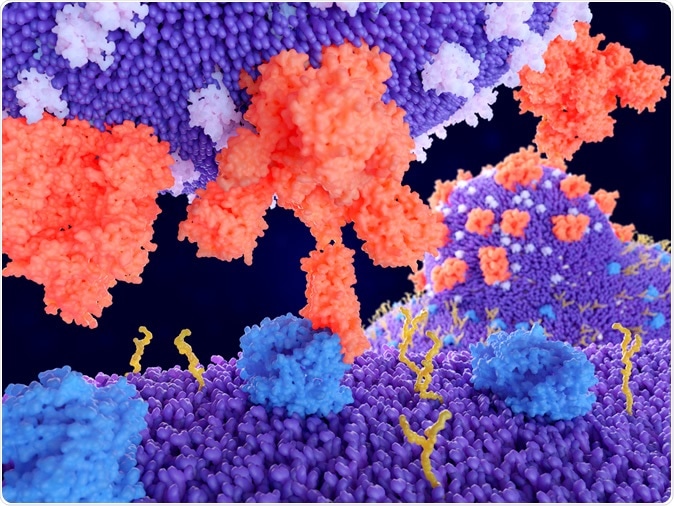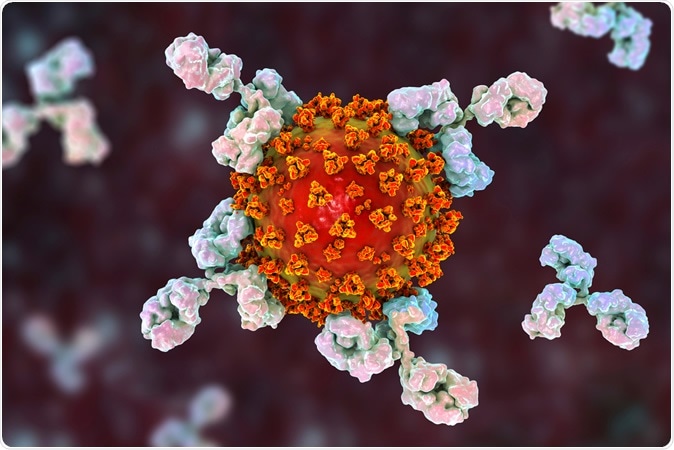By using both humanized mice and convalescent patients, the researchers from the US and Singapore successfully generated non-competing and highly potent monoclonal antibodies against severe acute respiratory syndrome coronavirus 2 (SARS-CoV-2) spike protein that could potentially be combined to form antibody cocktails. Their groundbreaking paper is published in the leading research journal Science.

Binding of the coronavirus spike protein(red) to an ACE2 receptor (blue) on a human cell leads to the penetration of the virus in the cell, as depicted in the background. Illustration Credit: Juan Gaertner / Shutterstock
The ongoing and disruptive coronavirus disease (COVID-19) pandemic is caused by SARS-CoV-2, which is a versatile virus that utilizes the angiotensin-converting enzyme 2 (ACE2) to enter human cells.
This process is mediated by viral surface spike protein (S-protein), which contains a receptor-binding domain that specifically recognizes the ACE2 receptor. Consequently, this could act as a weak spot of the virus that we could target with protective antibodies – a strategy already used in the past for different infections.
Most recently, fully human antibody treatments were generated to treat lethal Ebola infection; in this process, genetically humanized 'VelocImmune' (VI) mice were used to generate Ebola antibody cocktail treatment, while B cells sorting from a recovered patient provided a single therapeutic antibody treatment.
The researchers from Regeneron Pharmaceuticals, Inc. and the University of Maryland School of Medicine in the US, as well as from the National Centre for Infectious Diseases, Tan Tock Seng Hospital, Yong Loo Lin School of Medicine and Lee Kong Chian School of Medicine in Singapore, described parallel high-throughput efforts using both mice and humans to generate antibodies against the S-protein of SARS-CoV-2.
Producing antibodies by two parallel efforts
Anti-SARS-CoV-2 spike antibodies were produced with the use of two methods. First of them immunized VI mice with a DNA plasmid expressing SARS-CoV-2 S-protein, and then amplified the response with recombinant protein comprised of the SARS-CoV-2 spike receptor-binding domain.

Antibodies attacking SARS-CoV-2 virus, the conceptual 3D illustration for COVID-19 treatment, diagnosis and prevention. Image Credit: Kateryna Kon / Shutterstock
A second approach was based on the isolation procedure from peripheral blood mononuclear cells of human donors previously exposed to SARS-CoV-2. Those two approaches basically created two parallel efforts that used humanized mice and convalescent patients to generate antibodies.
In order to appraise antigen-specific responses, naturally-paired heavy and light chain complementary DNAs were cloned from B cells derived from mice and humans and subsequently transfected into Chinese hamster ovary cells to produce fully-human, but recombinant antibodies.
The magnitude of the genetic-engineering strategy utilized to create the VI mouse (which entailed genetic-humanization of over 6 megabases of mouse immune genes) has enabled to indistinguishably and effectively mimic the antibody responses in humans.
The end-goal of this research endeavor was to yield an extensive collection of fully-human antibodies and then to characterize them in detail for binding properties, neutralization abilities, and three-dimensional structure.
A potent and diverse collection of antibodies
"We generated a sufficiently large collection of potent and diverse antibodies that we could meet our prospective goal of identifying highly potent individual antibodies that could be combined into a therapeutic antibody cocktail," highlight study authors.
More specifically, their screening endeavor yielded more than 200 neutralizing monoclonal antibodies with rather broad potency ranges, while dozens of them exhibited neutralization potency in the picomolar range. In addition, VI mice elicited a robust immune response against the SARS-CoV-2 spike protein after immunization.
Most of the discovered neutralizing antibodies were in contact with the receptor-binding domain of S-protein by overlapping with the ACE2 interface. Furthermore, the researchers were also able to group antibodies based on their pattern of contacting the surface of the receptor-binding domain.
"We report remarkable similarities and consistencies in the antibodies generated from genetically-humanized mice and from convalescent humans," explain study authors in their cutting-edge Science paper.
Antibody cocktails that fight virus escape mutants
A prospective goal of this ambitious effort was to discover highly potent individual antibodies that could be effectively paired in a therapeutic antibody cocktail, aiming to decrease the potential for decreased efficacy in the long run.
The latter may arise due to the appearance of variants as the COVID-19 pandemic continues to spread, but also as a result of viral escape mutants in response to selective pressures from a single antibody treatment.
"We thus examined our nine most potent neutralizing antibodies in cross-competition binding assays, identifying several pairs of non-competing monoclonal antibodies with picomolar neutralization potency that could potentially be combined to form antibody cocktails," explain study authors.
This type of genetically-humanized mouse approach comes with a significant benefit that it can possibly allow for further optimization strategies of immunization, and also that it can be translated to non-infectious disease targets.
In conclusion, the addition of such antibodies into an antibody cocktail may provide optimal antiviral potency, minimizing at the same time the odds of viral escape – two indispensable traits of an antibody-based therapeutics for treating and preventing COVID19.